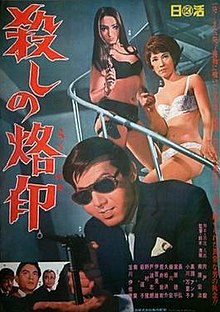
Back Branded to Kill German برند برای کشتن Persian La Marque du tueur French Branded to Kill ID La farfalla sul mirino Italian 殺しの烙印 Japanese 살인의 낙인 Korean Filem Branded to Kill Malay Branded to Kill Dutch Рождённый убивать (фильм, 1967) Russian
| Branded to Kill | |
|---|---|
 Theatrical release poster | |
| Directed by | Seijun Suzuki |
| Written by | Hachiro Guryu[a] |
| Produced by | Kaneo Iwai |
| Starring |
|
| Cinematography | Kazue Nagatsuka |
| Edited by | Mutsuo Tanji |
| Music by | Naozumi Yamamoto |
Production company | |
| Distributed by | Nikkatsu |
Release date |
|
Running time | 91 minutes |
| Country | Japan |
| Language | Japanese |
| Budget | ¥20 million |
Branded to Kill (Japanese: 殺しの烙印, Hepburn: Koroshi no Rakuin) is a 1967 Japanese yakuza film directed by Seijun Suzuki and starring Joe Shishido, Koji Nanbara, Annu Mari and Mariko Ogawa. The story follows contract killer Goro Hanada as he is recruited by a mysterious woman named Misako for a seemingly impossible mission. When the mission fails, he is hunted by the phantom Number One Killer, whose methods threaten his life and sanity.
Branded to Kill was designated by its production company and distributor, Nikkatsu, as a low-budget B movie. Dissatisfied with the original script, the studio called in Suzuki to rewrite and direct the film shortly prior to the start of production. Suzuki came up with many of his ideas for the project the night before or on the set while filming, and welcomed ideas from his colleagues; the screenplay is credited to Hachiro Guryu, a writing collective that consisted of Suzuki and seven other writers, including his frequent collaborators Takeo Kimura and Atsushi Yamatoya. Suzuki gave the film a satirical, anarchic and visually eclectic bent, which the studio had previously warned him away from. The brief turnaround Suzuki was given to make Branded to Kill meant that post-production on the film was completed only a day before its pre-scheduled release on June 15, 1967.
The initial critical and commercial failure of Branded to Kill prompted Nikkatsu to ostensibly fire Suzuki for making "movies that make no sense and no money".[2] In response, Suzuki successfully sued Nikkatsu, and garnered support from student groups, like-minded filmmakers and the general public, causing a major controversy throughout the Japanese film industry. Suzuki was blacklisted and did not make another feature film for a decade, but became a countercultural icon.[3]
By the 1980s, Branded to Kill had gained a strong international cult following; film critics and enthusiasts now regard it as an absurdist masterpiece.[4] It has been cited as an influence by filmmakers such as Jim Jarmusch, John Woo, Park Chan-wook, Quentin Tarantino and Nicolas Winding Refn, and composer John Zorn.[5] Branded to Kill inspired a loose 1973 Roman Porno remake directed by Yamatoya, Trapped in Lust, and a loose 2001 sequel, Pistol Opera, directed by Suzuki for Nikkatsu. The company has also hosted two major retrospectives spotlighting his career.
- ^ 川勝正幸 (2001). "ピストルオペラ Review" (in Japanese). テレビ東京 Cinema Street. Archived from the original on 2023-03-25. Retrieved 2007-10-24.
具流八郎(鈴木+木村威夫+大和屋竺+田中陽造+曽根+岡田裕+山口清一郎+榛谷泰明)
- ^ Cite error: The named reference
Branded to Kill DVDwas invoked but never defined (see the help page). - ^ Cite error: The named reference
Satowas invoked but never defined (see the help page). - ^ Cite error: The named reference
Volcanowas invoked but never defined (see the help page). - ^ John, Zorn (February 1999). "Branded to Kill". Criterion. Archived from the original on 2023-08-03. Retrieved 2015-11-04.
Cite error: There are <ref group=lower-alpha> tags or {{efn}} templates on this page, but the references will not show without a {{reflist|group=lower-alpha}} template or {{notelist}} template (see the help page).
© MMXXIII Rich X Search. We shall prevail. All rights reserved. Rich X Search